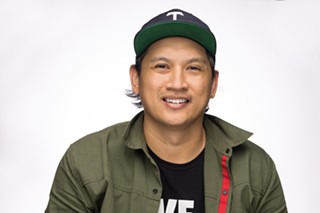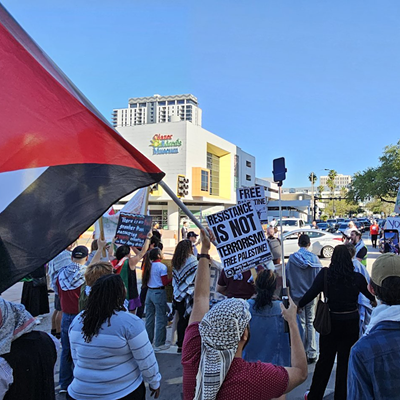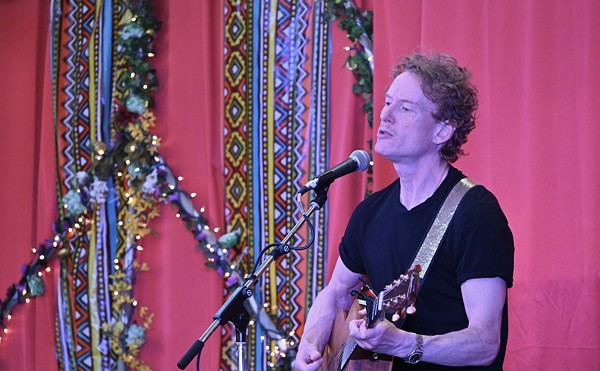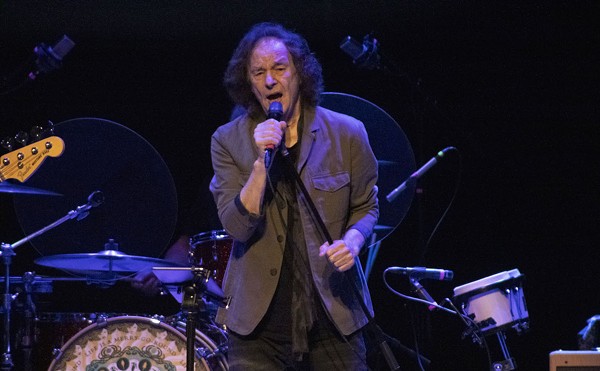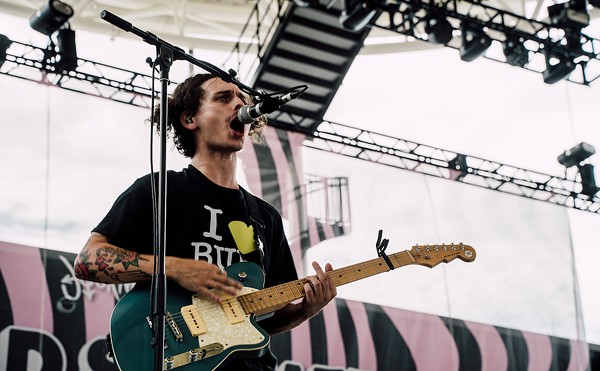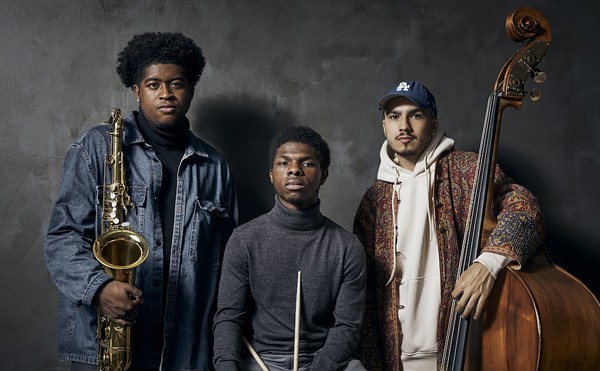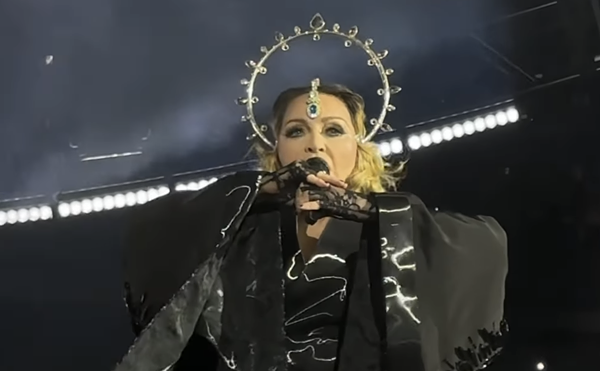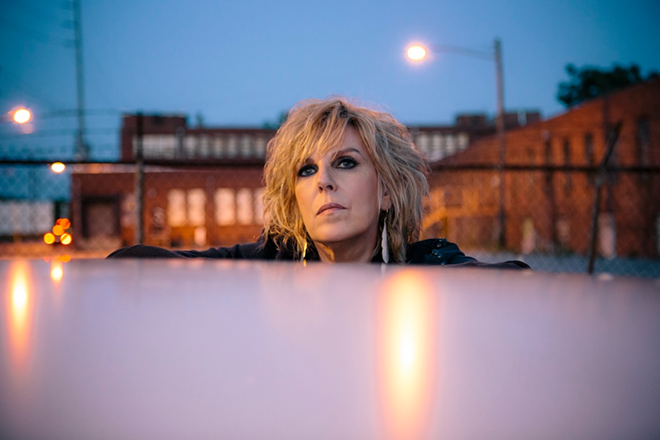
When CL catches up with Lucinda Williams, she’s in between the New York Times crossword puzzle and cooking an omelette for her husband and manager, Tom Overby. Williams used to do the puzzles in pen, but it’s completed online these days. The 66-year-old even cops to asking the next-gen crossword for a hint every now and then.
“I’m pretty good, but some of ‘em, get you stuck, so if you’re like ‘I don’t know this — just give me the damn word, I can’t stand this anymore,’ then the online one will tell you the word,” Williams says. There is a problem with getting a hint though.
“You skip the satisfaction of doing it though," she explains. "If you make a mistake in the paper it looks all messy when you’re doing it.”
It’s admittedly a relief to hear that the mind behind some of the most timeless, authentic, and pretty much flawless songs in country feels a little dirty about skirting the process.
For 30 minutes, Williams — who is still the perfectionist she’s been since her 1988 Rough Trade debut — waxed on about mistakes, the process behind new songs, a forthcoming memoir, having to sell off some publishing and more. Look below to read part of our Q&A, and see the full conversation via cltampa.com/music.
Lucinda Williams w/Drive-By Truckers/Erika Wennerstrom. Fri. Feb. 1, 7:30 p.m. Sold out. Jannus Live, 200 1st Ave. N., St. Petersburg. wmnf.org.
Hi, my phone was in the kitchen. I was over there doing crosswords, and I didn't hear it — so sorry.
Don't be sorry. I feel guilty because our paper famously has a very difficult crossword, so I know how loyal crossword people are.
Yeah, I've gotten addicted. I used to always do them in the paper, but then I started to do the ones online. The New York Times ones. I don't know what it is about crossword puzzles, but the thing about the ones online is that you can get hints and stuff.
Have you gotten really good at them?
Well, I'm pretty good. Some of 'em, you just get stuck. The online ones will tell you the word if you need it. You're like, "I don't know this — just give me the damn word. I can't stand this anymore." But you skip the satisfaction of doing it. Like if you make a mistake in the paper it looks all messy when you're doing it. I always do it in pen. I take used to take pencils.
You've been doing them for years.
I go through periods where I do 'em a whole bunch. You can do 'em on the plane, and it takes my attention off of the turbulence.
It's crazy to hear you say that you're not good at crossword puzzles because at one point, and you mention the New York Times, but it makes me thing of Darcey Fey — you told her that, “A million people could tell me this album’s great, and it won’t matter if I don’t feel that way in my gut.” So I imagine you being a crossword pro.
I'm not a pro, no. It helps you figure out words and stuff. Sometimes you'll just guess, and you'll say, "What the hell is that word? I have no idea what that means."
Does it ever lead you down the road to a song?
I don't know, maybe. I feel like anything that makes that part of your brain work is good for mental concentration. I've been working on songs at the same time as the crossword.
I'm assuming you spent December on the record? You've got the memoir going, too.
We were in Minneapolis for the holidays — that's where Tom is from. You know, my husband, my manager. We're home in L.A. right now, but it's just for two weeks. We're back out again, but we've got to get back into the studio at some point and do my album. I've been so busy with...
Charles.
Yeah, I did the Charles Lloyd album, and then we had a bunch of shows. I had my Car Wheels anniversary shows, so we've been pretty busy.
Yeah, everyone was so focused on Car Wheels, but you forget that Little Honey is 10 years old, too, that one gets lost between West and Blessed. Your 1988 Rough Trade debut is just as important to you in a way.
Yeah, right?
I'm not trying to call the touring a burden at all, but it sounds like you want to record and work on this album.
Yeah. I guess it's a little bit of a burden in that I have to come up with really good songs whenever I have an album. I can't have any throw ways, you know. I like the way we approached the last couple albums we did — Down Where the Spirit Meets the Bone and the other one — we just went in and cut a bunch of stuff. We had different musicians come in. Not just my own band, but other drummers, bass players and guitar players. It was really cool doing it like that. Being spontaneous. "Let's cut this song, let's cut that song," we weren't worrying about what was going on the album right away.
We just did a bunch of stuff, and then we separated the songs out, like, "These would be good together on one album, and these would be good on the others." We had outtakes, yeah, some didn't end up on anything. We did a recording of "Pale Blue Eyes;" Lou Reed died while we were in the studio. I'd always loved that song, and I already knew that song, so we just said, "Hey, let's cut that." So there was a lot of stuff like that, spontaneous stuff, and that's probably how we're going to do it again.
Does that folder of song ideas travel with you to Minnesota? I'm curious about the song starts that you have.
We have a whole bunch that I am working on at the same time. I start songs, and then, you know... sometimes I'm working on one, and then I'll start another one. There's a lot of works in progress. I kind of chip away at them, a little bit here, and a little bit there. Unfortunately I'm not real disciplined. I'm trying to get better at that. It's one of my new year's resolutions. You know how you hear about a lot of artists blocking out a certain amount of time, you know? They make it their writing time, even if they don't come up with anything. They still sit down with paper, pen, coffee, whatever. If it comes out, it comes out, but if it doesn't, it doesn't — they block that time out to do that. I think it's a good idea.
I usually kind of just wait for the muse, but the thing about that is now Tom is here kind of looking over my shoulder going, "You haven't written a song in however many weeks," and he's like, "We gotta get in the studio, and you don't have enough songs. You gotta start working on songs." You know.
I actually got something the other day. I was messing around. I got something. Once I get a few of the lyrics and I get a melody; once I get kind of a hook and get a few ideas for the lyrics, the melody, then I just have to go back and fill in the rest of the lyrics. It's kind of like a puzzle, almost. They're all different. Sometimes I'll just spurt out the song, and it'll all come out at once while others take longer to work on. You know?
Totally. It's amazing to hear you talk about finding all of that — the melodies and the hooks. Makes me think of "Pineola," which is is one of your brilliant no-chorus songs. Major labels kept telling you to write bridges before Rough Trade finally came around. You ever want to just remind people how wrong they were about you?
No, that's OK. I don't have any resentment about that or anything. For one, in terms of me not getting "discovered" before a certain age is that I don't feel like I was really ready. Bob Dylan writing these amazing songs at the age of 19 or whatever, but everybody is different. I don't feel like I really came into my own as a songwriter until about the time of the Rough Trade album. The songs on that album are it. I was ready to go at a certain point before that album came out, but in terms of not breaking through into my '30s — blah, blah, blah — I'm just kind of like, whatever.
I guess I'm kind of an anomaly now though. I'm gonna be 66, but I just don't feel that age. I don't know how you're supposed to feel when you're 66. I'm actually playing on my birthday.
Really.
Yeah, January 26th. I don't have my calendar with me, but it's one of the shows with the Drive-By Truckers.
Will you do anything different for a birthday show? I'm assuming the crowd will have a cake for you.
No, the band and the crew is gonna give me a card, but I'm gonna tell them that they better not bring a cake out and sing "Happy birthday."
That might be inevitable. I think that's Orlando, by the way, Lulu. Saturday, January 26th.
I'm looking forward to those shows with those guys, The Truckers. It's a great bill. We're all kind of coming from similar places. I wouldn't be surprised to see us sitting in with each other. I think it's gonna be fun.
Definitely will be fun. I wanted to ask you about your dad since you speak so fondly of him. You’ve talked a lot about his influence and that of his students. He was brutally honest with you, but did you ever get a chance to talk to your dad about what would’ve happened had he said "no" to you quitting the University of Arkansas after you got that regular gig in New Orleans?
Yeah, we talked a lot all the time, about all that stuff. He was just worried in the beginning. When I first started out he wanted me to get a degree in something in college so I would have something to fall back on. He was right in a way because it was hard going since I didn't have another trade. When I went out seeking my fame and fortune trying to be a musician, I had to work these waitress jobs. I worked in record stores, I worked in bookstores — that sort of thing. If the music thing hadn't worked out, then I don't know what I would have done. I'd probably have gone back to school, I guess. I don't know. My brother and sister and I were raised to pick something. To have a career in something, whatever it is. Be passionate about whatever your work is. My dad went to college. It was a big deal in his family. The kids went to college and got a degree in something. My dad taught school, his other brothers taught school. That kind of thing.
I wasn't really raised to get married and have babies and stuff. I was raised to decide what you want to do and pursue that. He didn't want me to have to suffer like he did when he was trying to make a living as a poet. He had a degree, and he could teach school, but what he really wanted to do was write poetry. His degree was actually in biochemistry, but he kept quitting. He would teach biochemistry for a while, and then he'd say, "I don't want to do this anymore. I want to be in the languages. I want to be in the creative arts." Finally, he was able to do that. Eventually he could tell that I was bound and determined, so he supported me and everything.
But that phone call was a big turning point. The interesting question would be, "What if he had said no. Come home." Would I have gone home and gone back to school? Who knows?
I think you know. You seemed pretty excited about the gig.
Yeah.
I like hearing you talk about these stories, and I know you're putting a lot of these down into a memoir. Your memoirs, are they still overwhelming the same way Essence was? Are you still worrying about whose feelings are getting hurt in the memoir?
Oh. God. Yeah, I am. The thing is that this is a whole new thing for me, writing a book. I've been kind of inspired by reading Jeff Tweedy's memoir, and once I started reading his I felt a little more relaxed because I realized that there aren't really any other rules. You can write it however you want. It doesn't have to be about your entire life, it can be about part of it.
Yeah, just one chapter.
Yeah. That kind of thing. He even says, in the beginning, "I wasn't trying to write a masterpiece book or anything. Wasn't trying to be on a bestseller list or anything. I just wanted to have fun with it and let people know about my life." The writing in his book is real casual. There aren't any photos in it, which is unusual and different, but I guess he said, "I don't want to mess with photos, so I just won't have any photos."
I don't know. It makes me feel a little more relaxed about it. It seems to be doing pretty well.
Yeah, everybody likes that memoir. He's very candid in it...
He's funny. He's got a dry sense of humor. I don't even know the process. Like, what is the process supposed to be? How do you do these things?
Yeah, are you still working with your editor in New York or have you been able to bring someone else in to have a stab?
Yeah, she just changed to a different publishing company, so we're following her there. The process has basically been Tom and I talking like two people in a bar or something. Usually we're at the kitchen table at the house when we're home. A lot is just spontaneous. I'll start remembering something and start talking, so he'll go, "Hang on a second, let me record this."
We did it just the other night. We'll get in-depth about something. So right now we've got just a ton of stuff recorded, and we've been sending it to a transcriber in New York who takes it off the tape and sends it back. The editor looks it over, Tom looks it over — that's where we're at right now.
The editor is excited about what she's seeing, and all this. We're gonna bring somebody else in, like a music writer who's done these before. To kind of just help organize it all. I'm feeling better about having that.
We've talked about whether we're going to bring in another person or not. Like, at first, I wanted to walk with someone like Peter Guralnick, or Anthony DeCurtis, or something. Kind of like the way the Paul Simon one was written.
The one that he did with Robert Hilburn?
Yeah, the new one.
That one was great.
The way they did it was that Paul Simon was just kind of like, "I don't want to have to..."
"Work on it, just come talk to me."
Work on it, really. Hilburn just took the helm. He just went out and interviewed a bunch of people and sat to talk with Paul Simon. Apparently the agreement was Robert Hilburn said, "Well I'll do all the legwork, and put it all together, and you can read it — hopefully you'll like it.
"But you can't tell me what to do with it."
But he said, "I have the final say on the book and what it covers." Luckily, Paul Simon said he liked it, but that was the trade-off. If Paul didn't really like something in the book, then he couldn't really change it. That's one way to do it. That's the easier way for the artist.
Yeah, Robert found a bunch of people. I interviewed him about that book, and he talked about going over his deadline, and really getting in there by having to talk to other people when Paul wasn't ready to talk to him.
Really? You talked to Paul Simon?
No, no, no. Hilburn. I don't think Paul wants to talk to anybody.
Haha. Robert Hilburn is a cool guy.
Yeah, he's an L.A. guy.
I've done interviews with him before; he's a good guy.
You end up playing “Drunken Angel,” “Lake Charles” and “Car Wheels on a Gravel Road” at pretty much every show, you even re-released Sweet Old World as This Sweet Old World since you had outgrown those songs. You’ve mentioned that old songs always take you back — are there any that you just avoid because the pain or memory is too real?
No, no. The only ones that I might avoid are the ones that are kind of... not as all written in my mind now. There are a couple, like that song "Lines Around Your Eyes," where I'm going, "God, I don't even like this song even though I wrote it." It's a cute, little song, whatever. When we re-recorded it I was like, "Well, this is kind of cool." It's interesting how you can go in now, with my voice the way it is now compared to then... when you listen to the original Sweet Old World album and then the new one, it's pretty amazing.
Part of it is the production on the original one isn't as good as it could've been. Everything sounds a little thinner. It was fun to see everything open up and move into a different space. That album was one of those that I always felt got lost in the tracks between the Rough Trade album and Car Wheels. A lot of people thought it was out of print for a while. The label still owns the masters, and we've been trying to get those from them forever. They didn't want to let it go, but they wouldn't keep it in print. I remember going into a used record store in Nashville in the '90s, and I found a copy of Sweet Old World in one of the record bins. It had a sticker on it that said "Out of print," so I went over, and I asked the owner of the store, and said, "Wait a second, this isn't out of print." He said, "That's what I was told."
That's one of the reasons we re-recorded the songs. Just the fact that I don't own the recordings of that. Also, this is really sad, but I had a really bad business manager several years ago, and we were just in dire straits, so I had to sell my publishing on my songs up to a certain point. That included the songs on that album.
Oh, man.
Yeah, welcome to the music business. Then, if we recorded them, I don't know, it's a business thing — I get all confused with that stuff. That's one of the reasons we re-recorded the songs instead of re-mastering them or something. It has something to do with publishing, not owning the masters or something — blah, blah, blah. I have to put that all behind me. I have a new publishing deal now with Wixen who worked with Tom Petty for years, and years and years. They're good people. It's a husband and wife company, so it's not a big corporate company like Warner/Chappell where I was before. I don't know why I'm telling you all this.
No, that stuff is really interesting to me. Your story, you know, how the labels didn't know what to do with you — blah, blah, blah, this and that — then you get on Rough Trade, this happens, and everybody kicks themselves. It's disheartening to hear about you having to sell your publishing, but at the same time it's kind of great to hear that the perfectionist is still inside of you. It makes you feel that there are still so many good, good songs left inside of you.
Yeah, that's sweet for you to say that.
And from what I know, Wixen is good for artists. I mean, they sued Spotify once, I believe.
Yeah, he took them on. He was one of the guys, in fact, filed a lawsuit — I don't know all the details. He confronted Spotify.
Sounds great for you. Selling publishing is sad, and I'm sure you'd like to re-release Sweet Old World in 2022, but, God, it sounds like you're still so devoted to your songs, and it sounds like you're still the perfectionist that you've always been. Some people would say that's bad, but I don't know if there's anything about having ambition about the art that you make. Happy for you in that sense.
Yeah. Thank you.
I don't want to take you away from your crossword puzzle.
Well, I gotta go make something to eat. Tom just got back. He had to get his passport renewed, so I'm gonna go make us an omelette.
Oh, awesome. Well, tell Tom we said hello. I hope you have a really happy birthday in Orlando. I hope you get a tasty cake.
I hope we see you at the show.
For sure.


